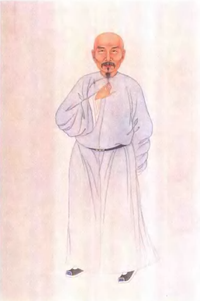Wei Yuan
Wei Yuan ( Chinese 魏源 , Pinyin Wèi Yuán , W.-G. Wei Yüan ; * April 23, 1794 ; † March 26, 1857 ), maiden name Wei Yuanda (魏 远达), court names : Moshen (默 深) and Hanshi (汉 士), was a Chinese scholar from Shaoyang (Hunan) . In 1831 he moved to Yangzhou , where he stayed for the rest of his life. Wei obtained the provincial degree ( juren ) in the Imperial Civil Service Examination and then worked in the secretariats of various prominent statesmen such as Lin Zexu . Wei was preoccupied with the crisis China faced in the early 19th century while remaining loyal to the Qing Dynasty . He made a number of suggestions for improving the administration of the Reich.
Early on, Wei sat for the "New Text School" (English: New text school ( 今文經 , jīnwénjīng )) of Confucianism and was a vociferous member (?) (English: vocal member ) of the "school of statecraft “, Which advocated practical learning in contrast to the supposedly dreary Han learning represented by scholars such as Dai Zhen ( Chinese 戴震 , Pinyin Dài Zhèn , W.-G. Tai Chen , January 19, 1724 - July 1, 1777) . Among other things, Wei advocated the sea transport of grain to the capital instead of via the Imperial Canal and advocated strengthening the border defense of the Qing Empire. The demographic crisis in the Chinese home country (English: proper, China Chinese 中国本土 , Pinyin Zhōngguó běntǔ ) to fix, to Wei also spoke for a migration on a large scale of Han Chinese to Xinjiang from.
Later in his career he became more and more concerned with the threat from the western powers and naval (coastal) defense. He wrote A Military History of the Qing Dynasty (聖武 記, Shèngwu Ji ) and a narrative work on the First (?) Opium War (道光 洋 艘 征 撫 記, Daoguang Yangsou Zhengfu Ji ). Nowadays he is best known for his work Illustrated Courier about the Overseas Countries (海 國 圖 志, Haiguo Tuzhì ) from 1844, which he compiled with the help of Western materials that Lin Zexu had collected during and after the First Opium War .
Individual evidence
- ^ Encyclopædia Britannica
- ↑ Liu Jing: Perception of the Stranger. China in Germany and Germany in Chinese travelogues from the Opium War to the First World War (PDF; 2.1 MB), p. 69 f.
literature
- Hummel, Arthur William (Ed.): Eminent Chinese of the Ch'ing Period (1644-1912). 2 volumes, United States Government Printing Office , Washington 1943.
- Jane Kate Leonard: Wei Yüan and China's Rediscovery of the Maritime World. Council on East Asian Studies, Cambridge (MA) 1984.
- Peter M. Mitchell: The Limits of Reformism. Wei Yuan's Reaction to Western Intrusion. In: Modern Asian Studies 6: 2 (1972), pp. 175-204.
- Xiren Tang: Wei Yuan . In: Encyclopedia of China . 1st edition.
| personal data | |
|---|---|
| SURNAME | Wei, yuan |
| ALTERNATIVE NAMES | 魏源; Wèi Yuán; Wei Yuan; Wei Yuanda; 魏 远达; Moshing; 默 深; Hanshi; 汉 士 |
| BRIEF DESCRIPTION | Chinese scholar |
| DATE OF BIRTH | April 23, 1794 |
| PLACE OF BIRTH | unsure: Shaoyang (Hunan) |
| DATE OF DEATH | March 26, 1857 |
| Place of death | unsure: Yangzhou |
